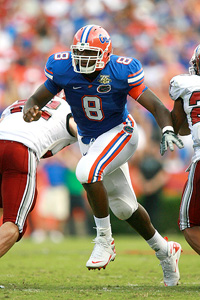In the world of college sports, the unexpected intertwines with the routine, often leaving fans in disbelief. The recent incident involving Florida Gators defensive end Carlos Dunlap, who faced charges for driving under the influence (DUI) just days before the Southeastern Conference (SEC) championship, is a case in point. This incident sends ripples through the sporting community, raising critical questions about accountability, behavior standards, and the broader implications for college athletes.
To comprehend the gravity of this event, one must delve beyond the headlines. Athletes are idolized, often placed on pedestals, where their imperfections can gloss over and even be excused. Yet, the reality is that they are human beings, prone to error, just like anyone else. However, when these errors manifest in ways that could jeopardize lives—such as choosing to drive under the influence—the conversation quickly shifts from empathy to outrage.
The timing of Dunlap’s arrest is particularly striking. It occurred just four days prior to what could be considered a pivotal moment in the Gators’ season. The SEC championship represents not just a game but the culmination of hard work, dedication, and dreams for both players and fans alike. The repercussions of an athlete’s irresponsibility can reverberate far beyond personal consequences; they can adversely affect an entire team, community, and the institution’s reputation.
At this juncture, it is imperative to explore the culture within college athletics that may contribute to such behavior. The pressure to perform at elite levels is immense. Young athletes, many just transitioning into adulthood, are thrust into environments characterized by rigorous expectations, both academically and athletically. Herein lies a paradox: the same individuals we venerate for their physical prowess often grapple with the intense psychological burdens associated with their status. The need to escape, to cope with stressors in unhealthy ways—how does society respond to these immense pressures?
The notion of accountability looms large in discussions of sports culture. In the wake of incidents like Dunlap’s, one must consider the responsibilities of athletic departments, coaching staff, and the institutions themselves. What measures are in place to educate young athletes about the consequences of their actions? Programs on substance abuse prevention, personal responsibility, and mental health should be as fundamental as training regimens. The onus cannot rest solely on the individual; systemic support is crucial in guiding these young men toward making better choices.
Moreover, scrutiny of media portrayal of such incidents is warranted. Coverage often oscillates between sensationalism and moralizing. A charged athlete is an easy target for vilification, while the socio-economic factors that contribute to reckless behavior are frequently overlooked. Why is it that the narrative often becomes one of shame rather than a teachable moment? Highlighting the complexities surrounding these events fosters a more nuanced understanding that can lead to constructive dialogue on reform and change.
Not to be neglected, the role of the broader societal view of athletes, particularly within the intersection of race and privilege, must be scrutinized. When a star player of color engages in behavior deemed irresponsible, it often stirs deeper cultural conversations about race relations and bias in judicial implications. These conversations are essential as they reshape the narratives surrounding college athletes as a whole. They reflect the unconscious biases that permeate understandings of accountability and moral judgement across various demographics.
In dissecting Dunlap’s situation, the discourse invites a reevaluation of priorities both within collegiate sports and society. The expectation of athletes transcends mere performance; they are expected to embody role-model characteristics, yet they often lack the requisite support structures to thrive holistically. Every mishap carries the weight of expectations, not just on personal shoulders but on that of the institution and its supporters.
Following Dunlap’s DUI charge, numerous inquiries arise. What repercussions will he face? Will this incident deter his career prospects, or will he emerge shielded by the very system that cultivates athleticism often at the expense of personal growth? For those keen on justice and morality, the response from both the university and the athletic community will speak volumes about current values and priorities.
Ultimately, this incident serves as a microcosm of a larger systemic issue within collegiate sports. As society grapples with the fine line between adulation and accountability, one reality becomes evident: it is imperative to advocate for a culture that emphasizes personal responsibility, mental well-being, and the importance of holistic support for young athletes. The narrative surrounding Carlos Dunlap should not solely be a tale of condemnation; rather, it should serve as a clarion call for comprehensive reform in how we view, support, and hold accountable our athletes.
In conclusion, Carlos Dunlap’s DUI charge encapsulates ongoing discussions about responsibility, culture, and systemic failures in collegiate athletics. This provocative incident must ignite necessary conversations—not just about the individual actions of one player but about the collective role of society in shaping the lives and decisions of young athletes. The need for change is now, and it is incumbent upon all of us to demand a more responsible, supportive, and truthful narrative surrounding the complex world of college sports.
